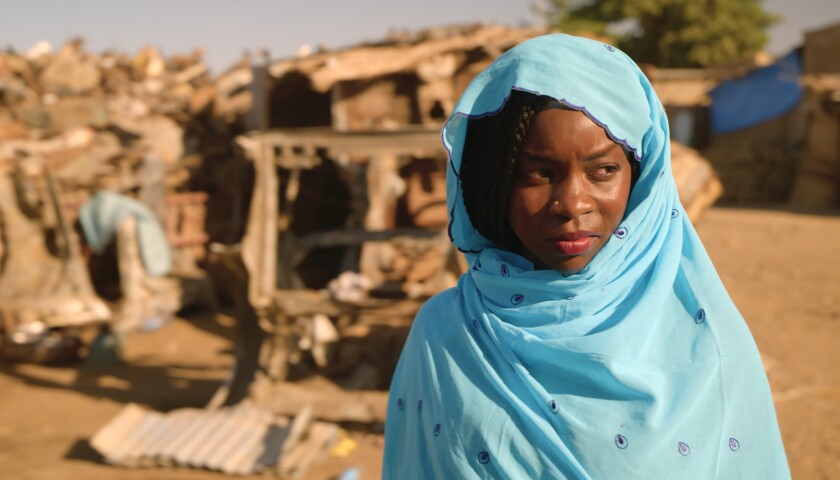Shared from www.latimes.com
“Lingui, the Sacred Bonds,” a taut, strikingly beautiful drama from the Chadian writer-director Mahamat-Saleh Haroun, begins with a bracing image of a woman at work. Amina (Achouack Abakar Souleymane) makes her living selling small stoves that she makes at home from salvaged materials: She cuts wires out of tires, hammers them out and twists them into spiral-shaped grates. The camera registers the sweat on her brow and the strain in her muscles, but also the satisfaction in her eyes as she surveys her handiwork. She finds fulfillment, even pleasure, in this tough labor. You sense that she also enjoys being left alone with her thoughts, far from the patronizing judgments of those who might deem this a singularly unsuitable job for a woman.
We’ll soon meet some of those individuals, most of them men who live in her conservative Muslim community on the outskirts of N’Djamena, Chad. There’s the stern neighborhood imam (Saleh Sambo), who scolds Amina for her less-than-perfect mosque attendance, and Brahim (Youssouf Djaoro), a friendly older merchant who insistently asks her to marry him. Amina endures these orders and entreaties with a good-natured forbearance that she’s clearly learned by necessity. In truth, she and her 15-year-old daughter, Maria (Rihane Khalil Alio), don’t need lectures or marriage proposals. What they need is a wad of cash, a shot of courage and the solidarity of other women who know how to keep the faith as well as a secret.
Maria is pregnant — something Amina finds out only from the girl’s school, which has expelled her in response. The air of pious condemnation that suddenly fills the air is both shocking and sadly familiar. Amina herself was just a teenager when she gave birth to Maria; her family disowned her for it and many of her neighbors still treat her like a pariah. Maria has no intention of suffering a similar fate; she wants to have an abortion, a procedure banned by law and their own religious traditions. But after giving in to a moment’s despair, Amina springs into action, summoning the unshakable determination we’ve seen in her from the beginning. Her daughter is all she has left, and her future must be safeguarded at any cost.
The title of “Lingui” refers to the “sacred bonds” that connect women in a community — age-old ties of sisterly solidarity that have long lain dormant in Amina’s life and that she must now forge anew. As she and Maria quietly go about their business, seeking help from a midwife (Hadjé Fatimé Ngoua) and reestablishing contact with an estranged relative (Briya Gomdigue), “Lingui, the Sacred Bonds” shows us a mother and daughter uniting against a world that’s long been set against them. Their journey might remind you of past art-house standouts like “4 Months, 3 Weeks and 2 Days” and “Never Rarely Sometimes Always,” both excruciatingly tense narratives about a young woman’s efforts to secure an abortion. (Two other similarly themed dramas are on the horizon: “Happening” and “Call Jane,” which take place in the 1960s but speak pointedly to the present war on reproductive rights, in the U.S. and beyond.)

Achouack Abakar Souleymane in the movie “Lingui, the Sacred Bonds.”
(Mubi)
“Lingui” isn’t as stark or clinical in its focus as “4 Months” or “Never Rarely”; Maria’s journey has its harrowing moments, but Haroun’s focus goes beyond the blow-by-blow specifics of her procedure. You sense that he’s angered by much of what he shows here: the unquestioned alignment of law and religious dogma; the ongoing practice of female genital mutilation, which figures into a key subplot; the hypocrisy of men who make a spectacle of their (questionable) virtue. Crucially, however, the director never seems to be imposing his anger from without. It wells up from deep within his characters, especially Amina, and Abakar Souleymane’s performance holds you with its warmth and ferocity. Before long that rage will spill out violently into the open, in a moment that feels like both an entirely logical consequence and a grave, nightmarish leap.
It’s a shattering development, set under darkening shadows that counter the movie’s otherwise bright parched-earth tones. (The elegant cinematography is by Mathieu Giombini.) Haroun has always had a superb eye for color and texture, and like his earlier, mostly male-focused character studies (“Daratt,” “A Screaming Man”), “Lingui,” with its dusty roads, high bridges and tranquil rivers, throws off an almost matter-of-fact beauty. Sometimes that beauty awakens both awe and dread, as in one solemn shot of a woman stepping into water, so quietly determined that it takes a moment for us to register what she’s doing. And sometimes the beauty seems double-edged, as when Amina walks through the city clad in a bright-hued robe — a vibrant expression of style and sensibility that nonetheless serves to hide her body from wandering male eyes.
Amina’s elegant garb stands in stark contrast to the sweat and dirt of that opening sequence, a contrast that is scarcely lost on Haroun. Again and again in “Lingui,” he shows us the delicate, performed femininity that a patriarchal society expects, then peels it back to study the tougher, harsher reality of how women like Amina and Maria survive. But there can also be joy in that survival, as well as a playful sense of subterfuge — a willingness to defy norms and break rules that Haroun pointedly frames not as a wrong but as a moral imperative. Amina’s liberation is her birthright and her lifelong pursuit. Her work continues.
‘Lingui, the Sacred Bonds’
(In French and Arabic with English subtitles)
No rating
Running time: 1 hour, 27 minutes
Playing: Starts Feb. 18 at Laemmle Royal, West Los Angeles
Images and Article from www.latimes.com
